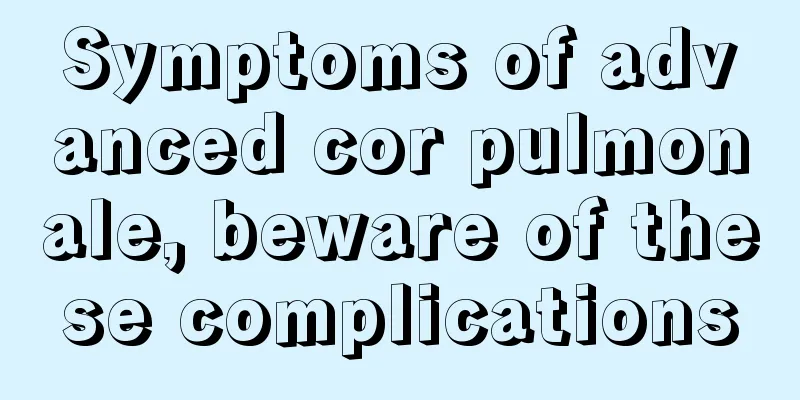Symptoms of advanced cor pulmonale, beware of these complications

|
Cor pulmonale is most common in patients with chronic lung disease and frequent smokers. This disease is not contagious, but it can cause some complications, such as arrhythmia, lung lesions, and especially in the late stages, symptoms of respiratory failure are prone to occur, and shock should be avoided. 1. Pulmonary encephalopathy: a syndrome of mental disorders and neurological symptoms caused by hypoxia and carbon dioxide retention due to respiratory failure. However, cerebral arteriosclerosis, severe electrolyte imbalance, simple alkali poisoning, infectious toxic encephalopathy, etc. must be excluded. It is the leading cause of death from cor pulmonale and should be actively prevented and treated. 2. Acid-base imbalance and electrolyte disorder: When respiratory failure occurs in cor pulmonale, due to hypoxia and carbon dioxide retention, when the body exerts its maximum compensatory ability and still cannot maintain homeostasis, various types of acid-base imbalance and electrolyte disorder may occur, making respiratory failure, heart failure, and arrhythmia worse. It is of great significance for treatment and prognosis, and monitoring should be carried out and treatment measures should be taken in time. 3. Arrhythmia: It is mostly manifested as atrial premature beats and paroxysmal supraventricular tachycardia, among which disordered atrial tachycardia is the most characteristic. There may also be atrial flutter and atrial fibrillation. In a few cases, ventricular fibrillation and even cardiac arrest may occur due to acute and severe myocardial hypoxia. Care should be taken to differentiate it from arrhythmias caused by digitalis poisoning, etc. 4. Shock: Shock caused by cor pulmonale is not common, but once it occurs, the prognosis is poor. The causes include: ① infectious toxic shock; ② hemorrhagic shock, mostly caused by upper gastrointestinal bleeding; ③ cardiogenic shock, caused by severe heart failure or arrhythmia. 5. Gastrointestinal bleeding. 6. Disseminated intravascular coagulation (DIC). |
<<: Diagnostic criteria for cor pulmonale, these identification bases
>>: How to treat pulmonary fibrosis, common treatment methods
Recommend
How to relax when you are too tired at work?
The current pace of life and work is much faster ...
Can white vinegar remove moles?
Moles are common things on the body. They are dis...
I feel inexplicably irritated
When people encounter unhappy things or bad thing...
5 Lifestyle Habits That Make You Tired
Staying energetic and in good condition requires ...
Can I eat before doing a chest CT scan?
When people have a physical examination, they usu...
What are the chances of curing bone cancer?
Bone cancer is a common malignant tumor disease, ...
Causes and treatments of low-grade fever caused by kidney cancer
Low-grade fever in kidney cancer is mainly relate...
Are there any sequelae after the ovarian tumor is cured?
Many women suffer from ovarian tumors. An effecti...
The cold-dispelling reaction after pushing the abdomen
After a winter full of festivals, female friends ...
Things to note when flying
Cars, trains, and airplanes have become essential...
What are the early symptoms of gastric cancer
The early symptoms of gastric cancer are often no...
What is the cause of swelling and itching in the lower body
There are many causes of swollen and itchy genita...
What should prostate cancer patients eat
For prostate cancer patients, treatment should be...
What are the main early symptoms of lung cancer? If there are 6 symptoms, be careful of lung cancer
Patients with early lung cancer generally have no...
How to identify mink fur
Mink fur is clothing made of mink fur. Compared w...









